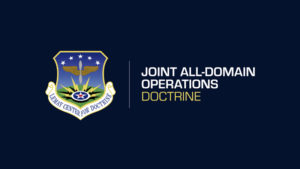The Department of the Air Force released the service’s first doctrine annex on Joint All-Domain Operations June 1, outlining how the service expects to maintain its competitive advantage.
Annex 3-1, Department of the Air Force role in JADO, builds on the doctrine note signed by Air Force Chief of Staff Gen. David Goldfein in March, and the direction to deter and defeat adversaries from the National Defense Strategy.
“Developing this new annex on an emerging concept was a challenge, and I’m proud of the efforts from all Airmen involved,” said Maj. Gen. Brad Sullivan, Curtis E. LeMay Center for Doctrine Development and Education commander. “Publishing JADO doctrine is a first step in changing how we think and conduct operations with the reemergence of great power competition.”
The LeMay Center expects to continue testing and evaluating the annex to improve DAF support to JADO development across the Department of Defense.

“While developing this emerging doctrine, we tapped into a community of experts across the Department of the Air Force. We will continue to engage and grow this community as we refine this doctrine,” said Lt. Col. Jeremy Holmes, LeMay Center, Air Force Doctrine Development director. “Working with the Air Force Warfighting Integration Capability was essential as they had already begun work to establish and further develop joint all-domain command and control concepts. Input from our existing doctrine community in the DAF was key, and will continue to be critical as we develop emerging JADO doctrine.”
Shortly after taking command in July, Sullivan directed LeMay’s Wargaming Center to design, develop and execute a wargame that would drive JADO insights. The first iteration of what would become the Chennault Series occurred in December and contributed to both the JADO doctrine note and annex.
“With the Chennault Series, we were able to leverage expertise resident in LeMay (Center), pull students in from across Air University resident programs and include subject matter experts from around the DAF,” Sullivan said. “The first two exercises in the series may be complete; however, we’ll continue to test and adapt JADO.”
As both the doctrine and the pace of near-peer competition evolves, the LeMay Center is looking for feedback from Airmen on how to improve Annex 3-1.
“This doctrine annex is not a static document, meant to gather dust in professional reading libraries,” Holmes said. “We expect to update Annex 3-1 at a more frequent pace as lessons are learned and best practices become apparent, but we need bright minds from across the DAF to identify what is missing.”
The LeMay Center for Doctrine Development and Education serves as the chief of staff of the Air Force’s principal agent for doctrine, Air Force Lessons Learned and provides Air Force input to joint doctrine. The center also assists in the development of concepts and strategy. For any matters dealing with basic and operational level doctrine, Air Force organizations coordinate directly with the LeMay Center. It accepts feedback on all doctrine through the doctrine website, email address, as well as a doctrine subReddit.


